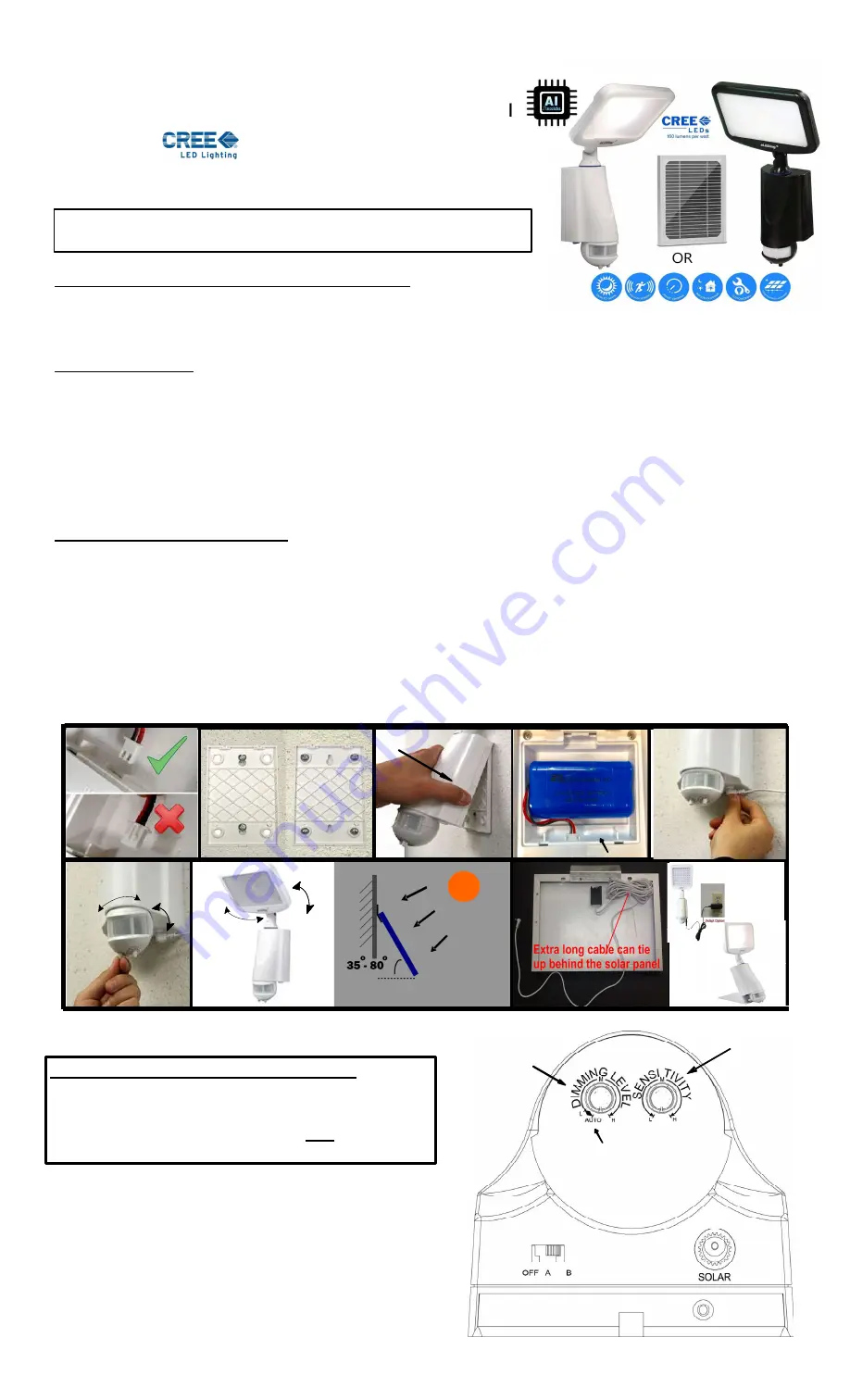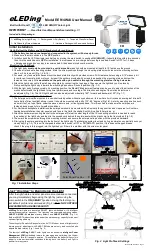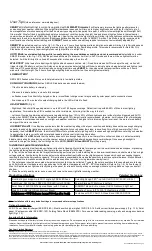
1 –
eLEDing
Solar Light Body 1 – Rechargeable Li-Poly Battery 1 – Tempered Glass Solar Panel
1 – Wall Mounting Plate w/hardware 2 – Hardware Package with Screws and Anchors
Model EE814WAI User Manual
Initial Installation
Included in this package:
IMPORTANT
….
Read this User Manual Before Installing...!!!
eLEDing
®
Get Initial test the Battery and LED illuminator before setting up
1.
The battery has been pre-charged and connected to the system, will be ready for use
2. Make sure the main switch is in the
OFF
position
3. Initially check the LED illuminator and battery by moving the main switch to position
ON (SMART),
it should light up within two seconds,
then turn the switch back to
OFF
for installation. In most cases no pre-charge before using is needed. Switch to OFF for 1-2 days
charging under good sunny day is recommended if it has been stored over 6 months.
Mounting the Light Body
1. The light body
must only be mounted in a vertical position
and it should be mounted at least 6 to 10 feet above the ground
2. Choose a flat and safe mounting surface. Mark the screw positions through the mounting plate screw holes onto the mounting surface
Use 2 or 4 hole mount (Fig. 1-2 & 1-3)
3. For wood, vinyl and metal surfaces mount the back plate directly with provided screws. Drill clearance holes using a 3/16" masonry bit
for surface of concrete, brick or stucco, by insert the anchors provided with screws then position the mounting plate and screw the
fasteners in securely.
It is mountable on the pole with nylon cable tie through the mounting plate four fixing holes also.
4. Attach the light body unit to the wall mounting plate by connecting the top hinges. Then secure the light body unit in place by
firmly pushing the light body in toward the mounting base where it locks in position (Fig. 1-3)
5. With the light body firmly secured in it’s mounting position, the
Pan & Tilt
adjustment features can be used to adjust the direction of the
motion detector and the light head for optimal performance and coverage. The direction and angle of the motion detector can
be adjusted (Fig. 1-6). The LED light head can also be adjusted horizontally 180
o
, forward and backward 120
o
(Fig. 1-7)
Mounting and Connecting the Solar Panel
1. The solar panel must be mounted in a non-obstructed position without any shadow on its top where it will receive an average of at least 4
hours daily of direct sunlight all year round. It should be mounted with a tilt of 35°- 80° degrees (Fig 1-8). A sturdy mounting location such
as a wall, roof, on top of patio, under the eaves, secure pole, or floor/ground base. This is required to make sure the solar panel is
fastened down properly for all weather conditions
2. For Northern hemisphere installations the solar panel should be mounted with a Southerly facing position and visa-versa for Southern
hemisphere installation the solar panel should face to the North (Australia, South Africa, South America e. g.)
3. Attach the hardware mounting bracket to the solar panel. Determine what length of the 10' connecting wire cord is needed to reach
the position of the light body and then tie the unused cord behind the solar panel with the plastic zip-tie that is provided (Fig. 1-9)
4. Then mark the screw holes through the mounting bracket and secure the solar panel in position with the provided hardware
5.
Firmly plug the solar panel plug into the bottom of the light body. That charging system is actived during a normal sunny, partially sunny or
cloudy day (Fig. 1-5). This unit is chargeable either main switch is OFF or ON (SMART) position, If this does not happen please
check if the plug is fully plugged into the light body or if there is a problem with the wire or solar panel
Fig. 1 Installation Steps
Built with AI and LED SMART Solar Light
Rev. EE814WAI 052020 Page 1
Pan & Tilt
P
T
7
P
6
Pan & Tilt
T
OR
2
8
3
1
2 Screws
4 Screws
9
Solar Panel Position
Replace or reconnect
the battery
1
Yes
No
Fig. 2 Light Profiles & Settings
Lighting Adjustments:
“SMART “ A & B profiles with Dimming level
adjustments from Min -L to Max-H
(Left Dial)
Sensitivity Range
(10'-60')
(Right Dial)
/DC power Input
Main Switch
Position for
“AUTO” Setting
Just “One Step” to Begin Using the Light
After the light fixture and solar panel are mounted and connected,
you may immediately begin using the light by just moving the
main switch to the
ON
(SMART)
position. Using the factory pre-
set default profile is recommended (Fig. 2).
Note:
NO FURTHER
ADJUSTMENTS ARE NECESSARY!!
eLEDing
Solar Lights are innovated SMART lights embedded w i t h intelligent
microprocessor control processor. The light has two selectable operating modes,
SMART A MODE
(
AI mode
as factory default) and
SMART B
MODE
(Fig. 1-4).
Both are SMART modes of operation and utilize stored energy capacity for the most
optimum lighting efficiency.
The settings for Sensitivity/Range of motion, AUTO Mode or levels of brightness in
dimming control adjustment with SMART B Mode are set only, and controlled with
adjustable dials refer by (Fig. 1-4 and Fig. 2)
The family of
eLEDing
SMART solar lights use an exclusive
Intelligent Power
Management (IPM)
embedded feature for managing and optimizing the Lithium
based battery for a full range of operation. This optimizes the battery’s life cycle to
adapt to most environmental conditions allowing both the battery and light to
perform for many years.
OFF ON
9
5
10
Option
Push in
SW-2
Smart B
Smart A
4




















